Meditation techniques provide effective solutions for stress relief and emotional balance. This article explores mindfulness meditation, loving-kindness meditation, and body scan meditation. It discusses how these practices foster mindfulness, enhance emotional resilience, and promote relaxation. Additionally, it addresses common challenges beginners face and offers tips for integrating meditation into daily life.
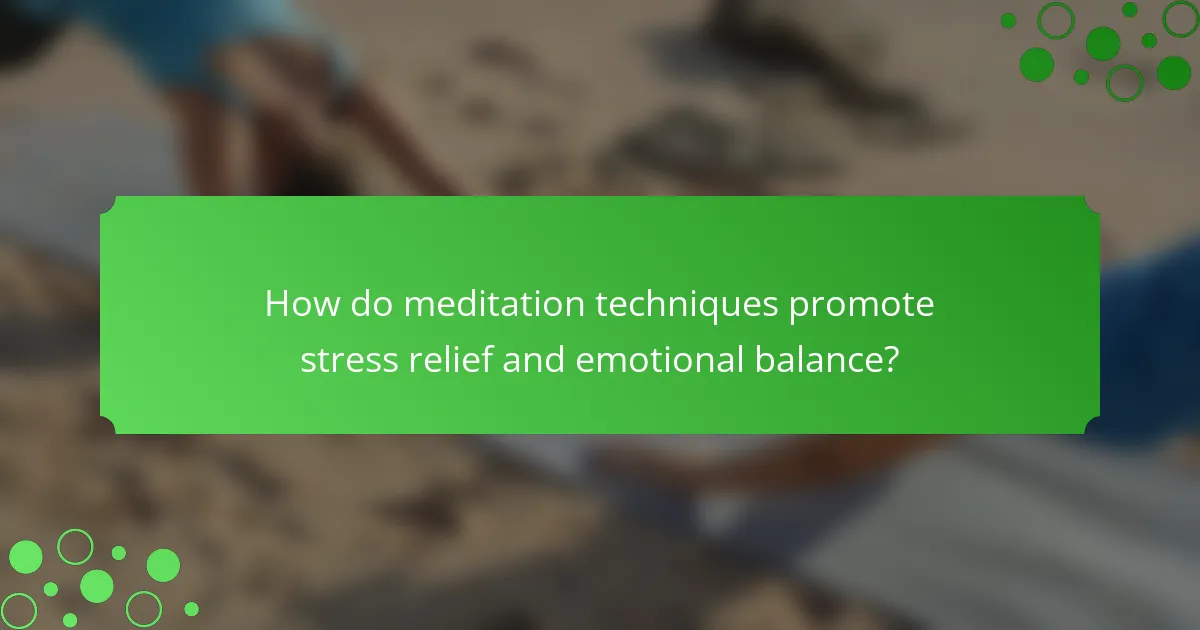
How do meditation techniques promote stress relief and emotional balance?
Meditation techniques effectively promote stress relief and emotional balance by fostering mindfulness and reducing anxiety. Techniques such as mindfulness meditation, loving-kindness meditation, and body scan meditation help individuals connect with their emotions and cultivate a sense of calm.
Mindfulness meditation encourages present-moment awareness, which can decrease rumination and stress. Studies show that regular practice can lower cortisol levels, contributing to emotional stability. Loving-kindness meditation enhances feelings of compassion, leading to improved interpersonal relationships and emotional resilience.
Body scan meditation promotes relaxation by encouraging awareness of bodily sensations, helping to release tension. This technique can also improve sleep quality, which is closely linked to emotional balance.
Incorporating these techniques into daily routines can yield significant benefits, including enhanced mental clarity and reduced stress levels.
What are the physiological effects of meditation on stress?
Meditation significantly reduces stress by promoting relaxation and emotional balance. It lowers cortisol levels, enhances focus, and improves overall well-being. Regular practice can lead to structural changes in the brain, increasing gray matter in areas related to emotional regulation. Studies show that mindfulness meditation can decrease anxiety and improve mood, making it a powerful tool for stress management.
How does meditation influence emotional regulation?
Meditation significantly enhances emotional regulation by promoting mindfulness and reducing stress. Regular practice fosters greater awareness of emotional states, enabling individuals to respond rather than react to feelings.
Research indicates that mindfulness meditation can decrease anxiety and depression levels, leading to improved emotional balance. Techniques such as focused breathing and body scans help individuals recognize and manage their emotions effectively.
Moreover, meditation encourages the development of a non-judgmental attitude toward thoughts and feelings, which is crucial for emotional resilience. This practice can lead to lasting changes in brain regions associated with emotional regulation, such as the prefrontal cortex and amygdala.
Incorporating meditation into daily routines can thus serve as a powerful tool for enhancing emotional well-being and fostering a balanced state of mind.
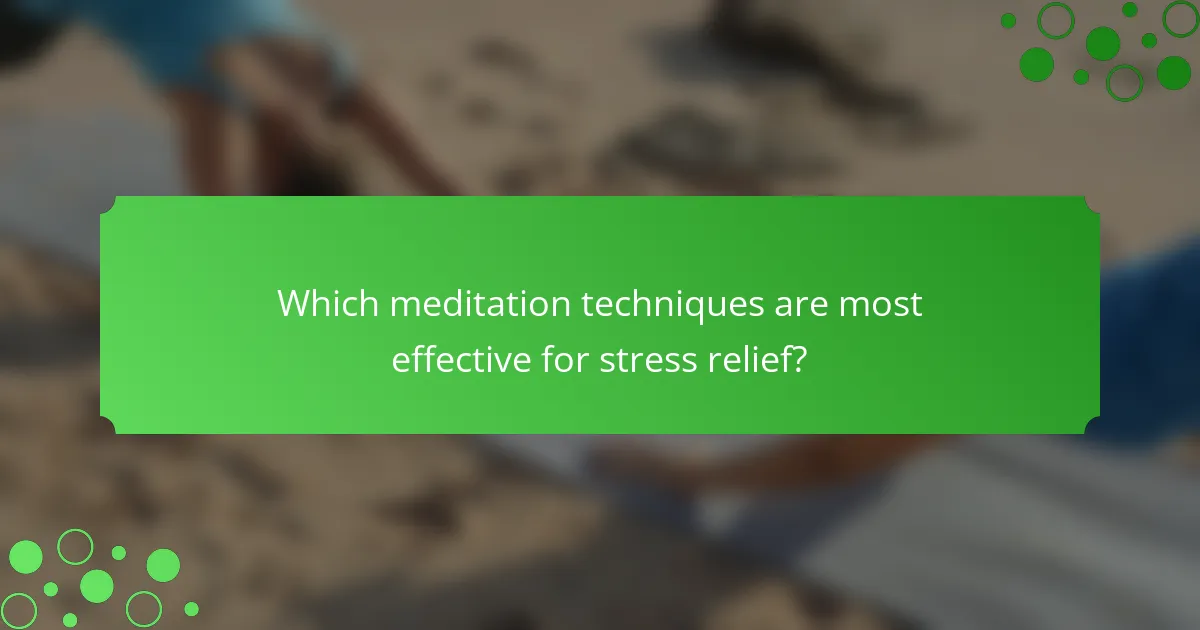
Which meditation techniques are most effective for stress relief?
Mindfulness meditation, progressive muscle relaxation, and guided imagery are the most effective techniques for stress relief. Mindfulness meditation enhances present-moment awareness, reducing anxiety. Progressive muscle relaxation systematically relaxes muscle groups, alleviating physical tension. Guided imagery encourages mental visualization of peaceful scenes, promoting emotional balance. Each technique uniquely contributes to stress reduction, making them valuable tools for emotional well-being.
What is mindfulness meditation and how does it work?
Mindfulness meditation is a technique that promotes awareness and acceptance of the present moment. It works by focusing attention on thoughts, feelings, and sensations without judgment, helping to reduce stress and enhance emotional balance. Practitioners often experience improved mental clarity and emotional resilience. Research indicates that regular mindfulness meditation can lead to a decrease in anxiety levels and an increase in overall well-being. This technique is accessible to anyone, requiring no special equipment or setting, making it a valuable tool for stress relief.
How does loving-kindness meditation enhance emotional well-being?
Loving-kindness meditation significantly enhances emotional well-being by fostering compassion and reducing negative emotions. This practice encourages individuals to cultivate positive feelings toward themselves and others, which can lead to increased happiness and emotional resilience. Research indicates that participants often experience lower levels of anxiety and depression after engaging in loving-kindness meditation. Furthermore, studies show that this technique can increase overall life satisfaction and improve interpersonal relationships. By regularly practicing loving-kindness meditation, individuals can develop a more positive outlook on life, enhancing their emotional balance and stress relief.
What role does guided imagery play in stress reduction?
Guided imagery significantly aids in stress reduction by promoting relaxation and mental clarity. This technique involves visualizing peaceful scenes or scenarios, which helps calm the mind and body. Studies show that guided imagery can lower cortisol levels, a stress hormone, and enhance overall emotional balance. Practicing this method regularly can lead to long-term benefits, such as improved coping skills and reduced anxiety.
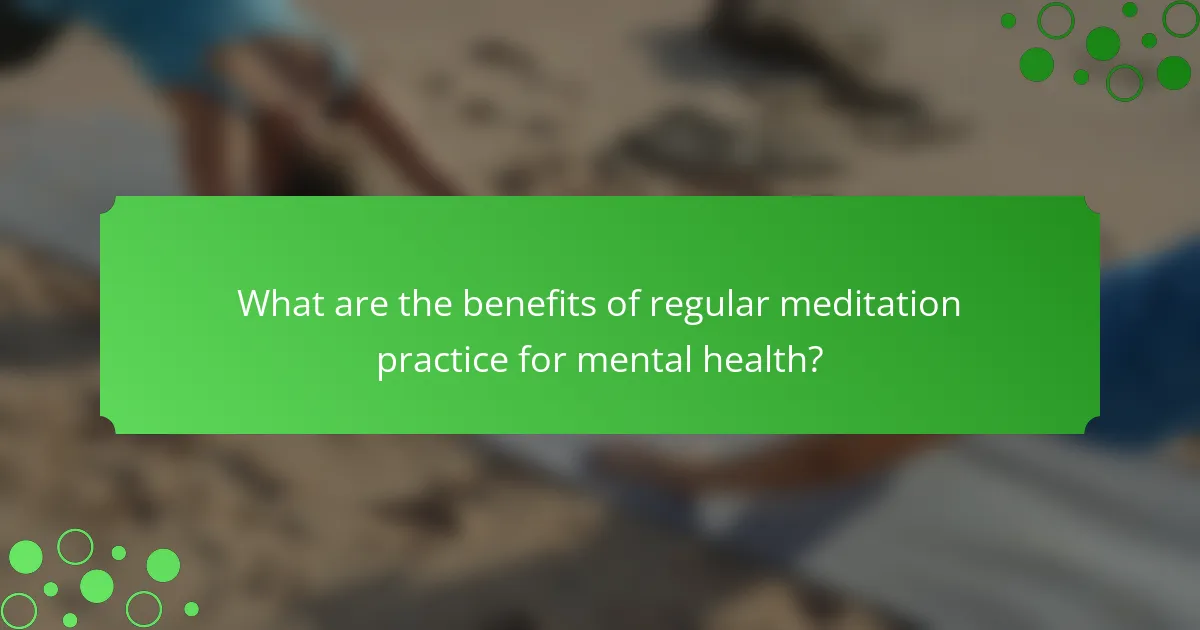
What are the benefits of regular meditation practice for mental health?
Regular meditation practice significantly enhances mental health by reducing stress and promoting emotional balance. It fosters mindfulness, which can lead to improved focus and decreased anxiety levels. Studies show that consistent meditation can lower cortisol levels, the hormone associated with stress. Additionally, it can improve mood regulation, helping individuals manage their emotions more effectively. Regular practitioners often report increased feelings of well-being and resilience against daily challenges.
How does meditation improve focus and concentration?
Meditation significantly enhances focus and concentration by training the mind to maintain attention on specific tasks. Regular practice improves cognitive control, reduces distractions, and fosters a calm mental state, which collectively boosts productivity. Research indicates that mindfulness meditation, in particular, strengthens neural connections linked to attention and awareness. This unique attribute makes meditation an effective tool for achieving sustained mental clarity and improved performance in daily activities.
What impact does meditation have on anxiety and depression?
Meditation significantly reduces anxiety and depression symptoms. Techniques like mindfulness and guided imagery promote emotional balance and stress relief. Research indicates that regular meditation can lower cortisol levels, enhancing overall mental health. A study found a 30% reduction in anxiety after eight weeks of consistent practice.
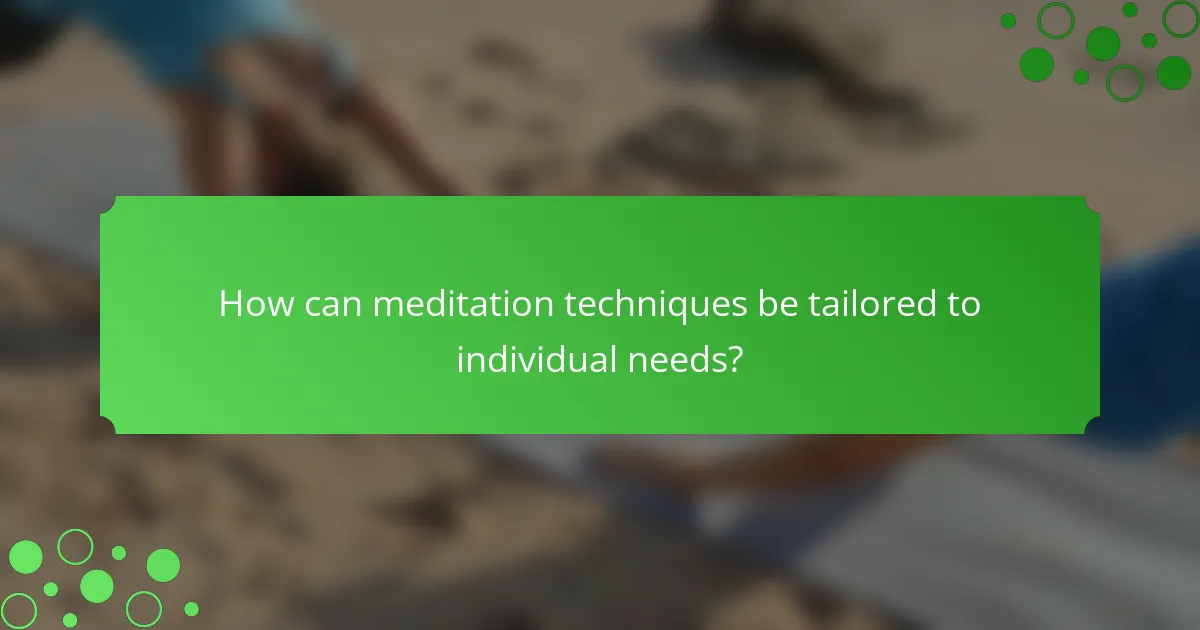
How can meditation techniques be tailored to individual needs?
Meditation techniques can be effectively tailored to individual needs by assessing personal stress triggers and emotional states. Customization enhances the benefits of meditation, making it more impactful.
Individuals may prefer mindfulness meditation for anxiety relief, while others might find guided imagery more effective for emotional balance. Additionally, incorporating breathwork can enhance focus and relaxation, catering to those with specific stress responses.
Experimenting with various techniques allows individuals to identify what resonates best with their unique preferences and lifestyles. Regular practice and reflection on what feels most beneficial can further refine their meditation approach.
Ultimately, the goal is to create a personalized meditation practice that aligns with individual needs, promoting lasting stress relief and emotional stability.
What factors should influence the choice of meditation style?
The choice of meditation style should be influenced by personal preferences, goals, and lifestyle. Factors include the desired outcomes, such as stress relief or emotional balance, and the time available for practice. Consideration of the environment, physical comfort, and previous experiences with meditation can also guide the decision. Additionally, exploring various techniques, such as mindfulness, guided meditation, or transcendental meditation, can help identify what resonates most effectively.
How do personal goals shape meditation practice?
Personal goals significantly influence meditation practice by providing focus and motivation. When individuals set specific objectives, such as reducing anxiety or improving concentration, they tailor their meditation techniques accordingly. For instance, someone aiming for emotional balance may prioritize mindfulness meditation, while another seeking stress relief might explore guided imagery. This personalization enhances engagement and effectiveness, allowing practitioners to align their sessions with their unique aspirations. As a result, meditation evolves into a powerful tool for achieving personal growth and emotional well-being.
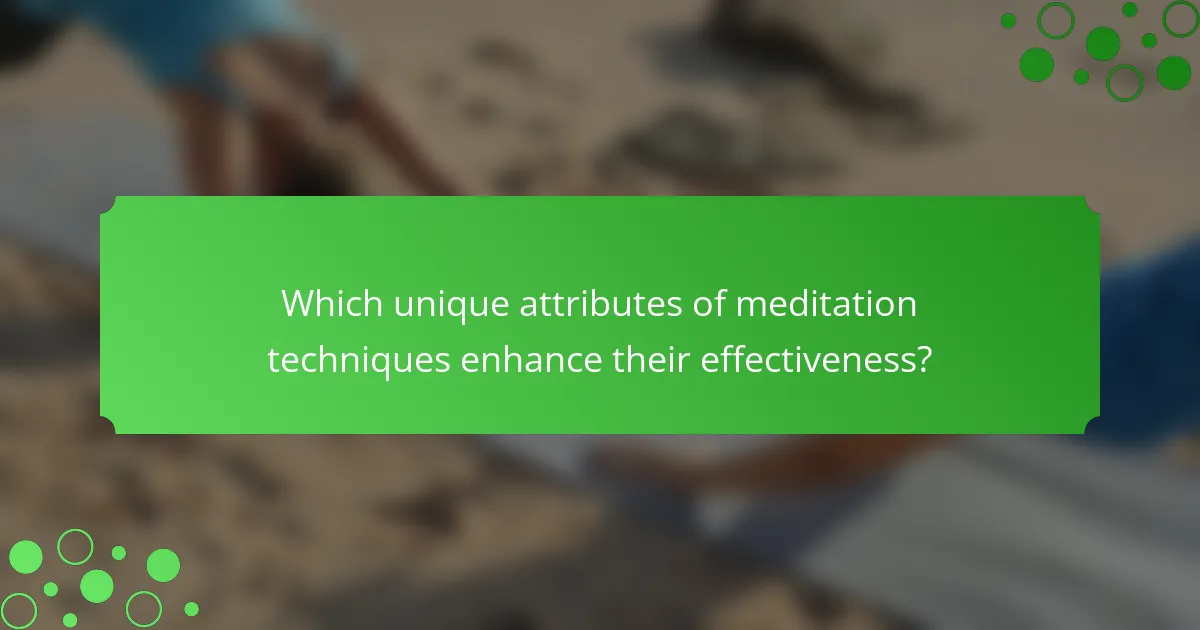
Which unique attributes of meditation techniques enhance their effectiveness?
Unique attributes of meditation techniques, such as breath awareness and visualization, enhance their effectiveness for stress relief and emotional balance. Breath awareness fosters mindfulness, grounding practitioners in the present moment. Visualization techniques create mental imagery that promotes relaxation and emotional healing. The adaptability of techniques, like loving-kindness meditation, encourages emotional connection and compassion. Additionally, the integration of sound, such as chanting or using singing bowls, can deepen the meditative experience and enhance emotional release.
How does the duration of meditation sessions affect outcomes?
Longer meditation sessions generally lead to more significant stress relief and emotional balance. Research indicates that sessions lasting 20 minutes or more can enhance mindfulness and reduce anxiety. For instance, a study found that participants who meditated for 30 minutes daily reported lower stress levels compared to those with shorter sessions. Additionally, the cumulative effect of longer durations can improve emotional regulation over time, promoting a more stable mental state. Regular practice of extended sessions can also deepen one’s connection to the meditation process, fostering greater insight and clarity.
What is the significance of the environment in meditation practice?
The environment plays a crucial role in meditation practice by influencing focus and relaxation. A serene and natural setting enhances emotional balance and reduces stress. Natural elements, such as sounds of water or rustling leaves, can deepen the meditative experience. Additionally, a clutter-free space fosters mental clarity, allowing practitioners to connect more deeply with their inner selves. This alignment with the environment can lead to more effective stress relief and emotional regulation.
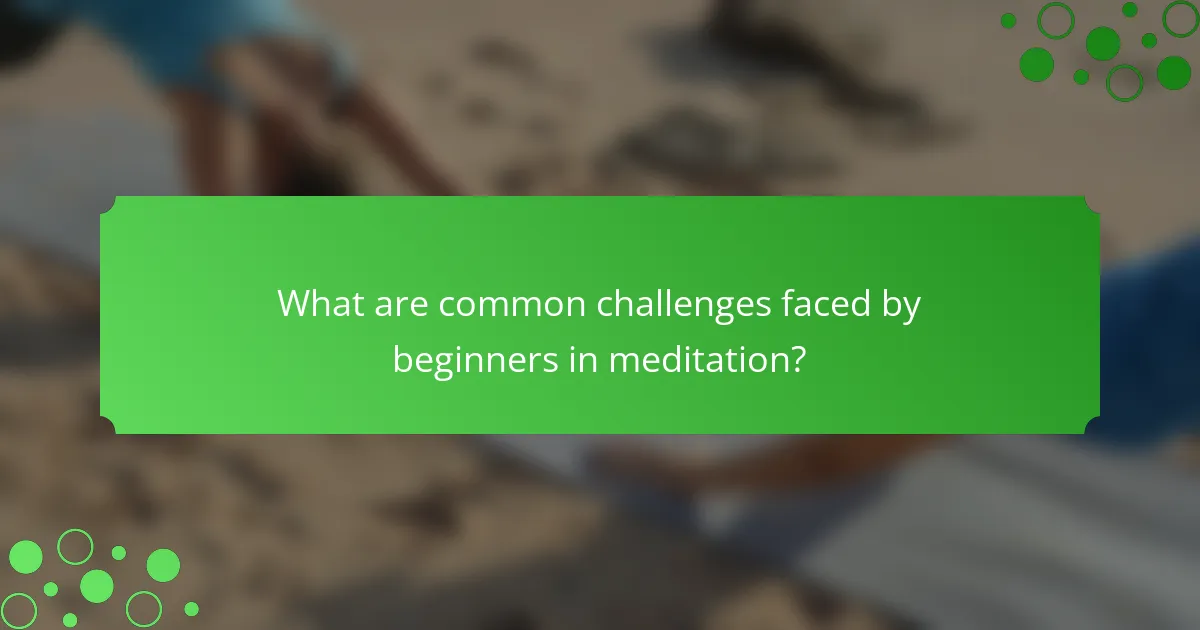
What are common challenges faced by beginners in meditation?
Beginners in meditation often face challenges such as difficulty in maintaining focus, managing racing thoughts, and establishing a consistent practice. Many struggle with physical discomfort during sessions, which can hinder their experience. Additionally, unrealistic expectations about immediate results can lead to frustration. Time management issues may also arise, making it hard to dedicate regular time for meditation. Finally, beginners may find it challenging to choose from various techniques, leading to confusion.
How can distractions be minimized during meditation?
To minimize distractions during meditation, create a dedicated space and establish a routine. Limit external noise by using earplugs or calming music. Focus on your breath to anchor your attention. If thoughts arise, gently redirect your focus without judgment. Practicing mindfulness enhances your ability to remain present and reduces intrusive thoughts.
What strategies help maintain motivation in meditation practice?
To maintain motivation in meditation practice, establish a routine, set clear intentions, and track progress. These strategies enhance commitment and reinforce emotional balance.
1. Create a consistent schedule for meditation sessions.
2. Define specific goals for each session to stay focused.
3. Use a journal to reflect on experiences and progress.
4. Explore various meditation techniques to keep practice engaging.
5. Join a community or group for support and accountability.
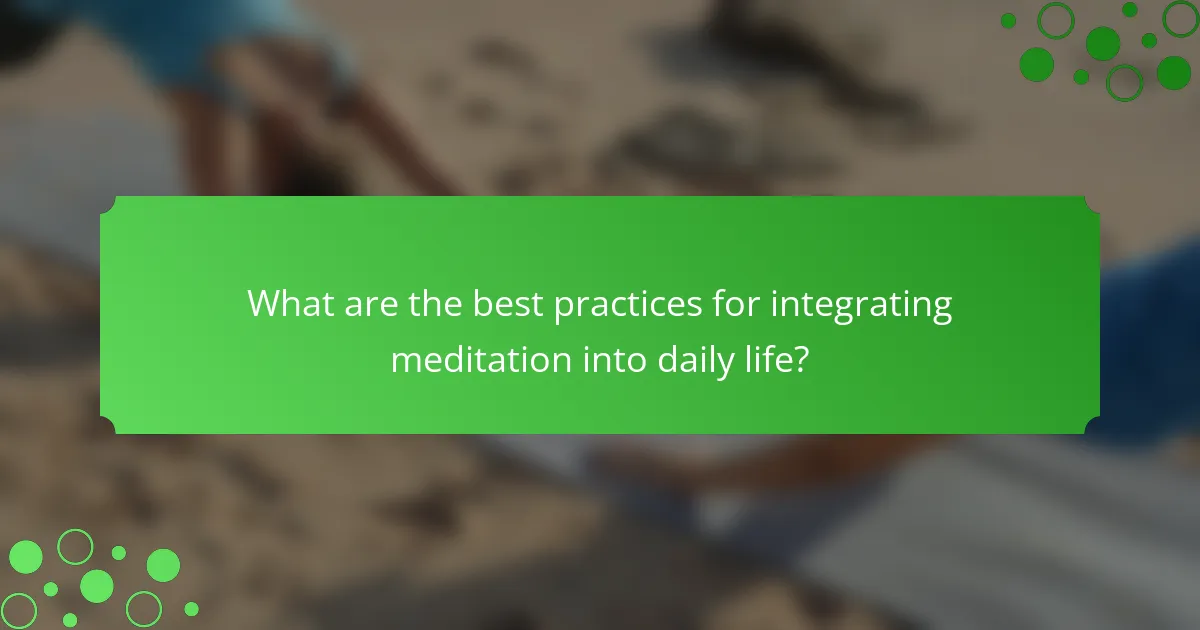
What are the best practices for integrating meditation into daily life?
Integrating meditation into daily life involves consistent practice, mindful scheduling, and creating a conducive environment. Start with short sessions, gradually increasing duration as comfort grows.
1. Establish a routine: Choose a specific time each day for meditation to create a habit.
2. Find a quiet space: Designate a tranquil area free from distractions for your practice.
3. Use guided sessions: Leverage apps or online resources for structured guidance, especially for beginners.
4. Incorporate mindfulness: Practice mindfulness throughout the day, such as during meals or walks, to enhance overall awareness.
5. Set realistic goals: Aim for achievable milestones, like meditating for five minutes daily, to build confidence and consistency.
6. Reflect on progress: Regularly assess your emotional and mental state to recognize the benefits of meditation.
How can one create a consistent meditation routine?
To create a consistent meditation routine, establish a specific time and place for practice. Start with short sessions, gradually increasing duration as comfort grows. Incorporate various techniques like mindfulness, guided meditation, or breathing exercises to maintain engagement. Track progress to reinforce commitment and adjust practices as needed.
What tips can enhance the effectiveness of meditation sessions?
To enhance the effectiveness of meditation sessions, establish a consistent routine, create a calming environment, focus on your breath, and incorporate mindfulness techniques. These strategies can deepen relaxation and improve emotional balance.
1. Set a regular schedule to meditate daily.
2. Choose a quiet, comfortable space free from distractions.
3. Concentrate on your breathing to anchor your mind.
4. Use guided meditations or apps for structure.
5. Experiment with different techniques, such as visualization or body scans.
6. Reflect on your experiences to track progress and adjust practices.